Indian press and Socio-cultural and Religious Transformation in Colonial Rule of 19th and 20th Centuries: A New Perspective – National Seminar held at Nsgarjuna University, Ongole Campus [1]
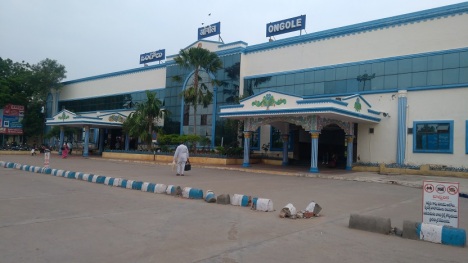
Ongole Railway station – new look

Lodge -changing names
Reaching Ongole for the seminar: The National Seminar on “Indian press and Socio-cultural and Religious Transformation in Colonial Rule of 19th and 20th Centuries: A New Perspective” was held on September 19th and 20th at Acharya Nagarjuna University, Ongole Campus, Ongole, AP. I proceeded to Ongole on 18th afternoon by Pinakini Express and my friend Sri Madhusudhana Rao was to join me at Nayudupet. But he contacted me that he would be joining me at Ongole, as he was coming by bus directly. Meanwhile, I was informed that G. J. Sudhakar retired prof was coming I the same train. So when I started searching, luckily he was standing near door in the next compartment. So we were talking and reached Ongole, bt, the moment, the train reached station, there was heavy downpour. As we were asked to come to the car, we came out, but drenched. They took us to one lodge and accommodated there. Later, I came to know that it was “Royal Residency.”[1] By 8 pm, Madhusudhana Rao also reached the lodge.
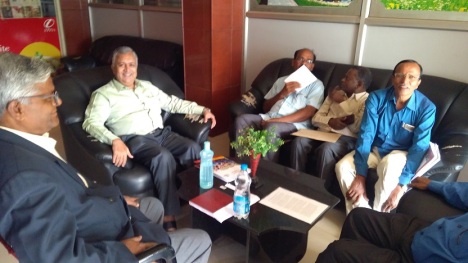
Waiting for vehicle to proceed to seminar venue
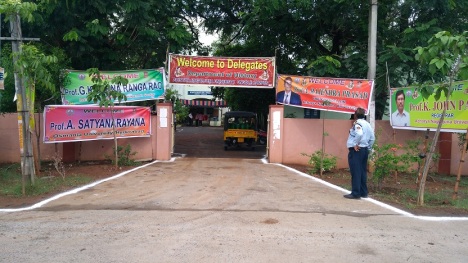
Entrance to the seminar venue, ANU Ongole campus
The delegates were accommodated at “Royal Residency,” Trunk Road, near Nellore Bus stand, Ongole. All arrangements were made systematically. The research scholars like Narendra received the invited speakers and paper presenters. I have been visiting Ongole for the eighth time in connection with attending seminars and conferences. Every time, the city has been going on changing with multi-storied buildings, commercial complexes and flats coming up. Yet, the food served at the hotels have not been changed. As I mentioned in the earlier blogs, here, one can see varieties of side dishes – 10 curries-poriyals, 15 sambars-Kuttus, 20 pickles – sold! If you have rice cooked, you can enjoy meals with these varieties of dishes! Of course, Ongole station has also changed with the facilities of elevator and lift for going to other platforms.
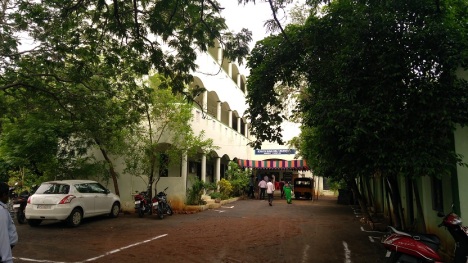
Going inside the ANU Ongole campus……
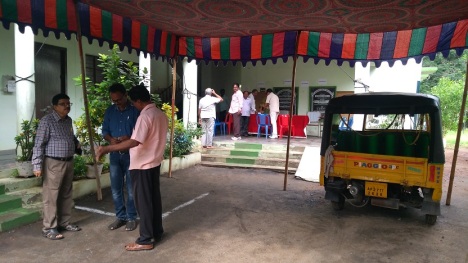
Organizers discussing………………….
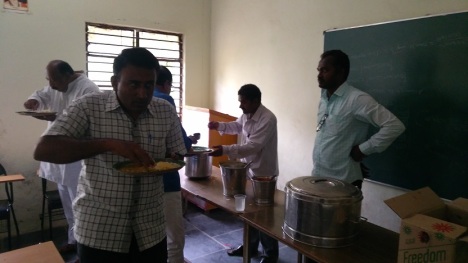
Delegates taking breakfast
19-09-2018, 11.40 am – first day: The seminar was held at the auditorium situated at the second floor of the building. Here, there is no lift, in other words, the building has not changed like Ongole. Now a days, lifts can be provided with 4 to 8 lakh budget and it is not at all a big amount for Universities, as they get funds. As usual, the ritual of lamping of lamps or lighting lamps was carried on with VIPs on the stage with shoes…Perhaps only one person removed his chappals, as could be noted from the photo. This is pointed out because, nowadays, much hype is created about one standing or sitting while invocation, anthem etc., is sung. On Wednesday, the first day, the Acharya Nagarjuna University Vice-Chancellor, A Rajendra Prasad inaugurated the seminar and said that the press reflects the public and being witness for the social change[2].
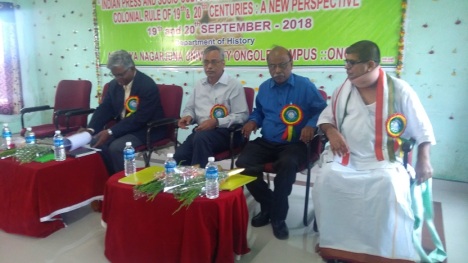
Inauguration – Krishna Ranga Rao, VC, Adapa Satyanarayana and Chandrasekhar Kalkura
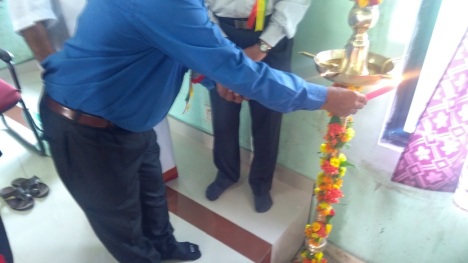
Adapa lamping
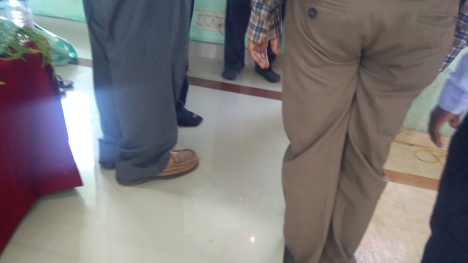
With shoes
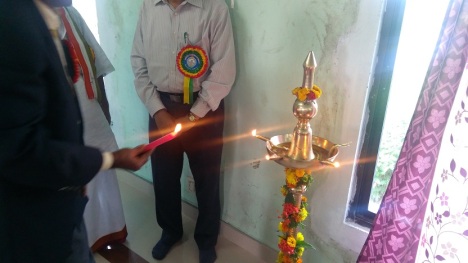
11.40 am to 12.14 pm – G. Krishna Ranga Rao[3]: Krishna Rangarao Gujjari, former professor in IITTM and Indian Institute of Tourism Management, Gwalior said in his key-note address that English as lingua franca united the country and brought a long lasting influence on society, that included the Indian press. Most of the freedom fighters had studied aboard. English and Western culture or its way of life as covered in journals, newspapers and magazines continued to influence the Indian culture to this day. Now the process had been accentuated by social media, he said. The influence of the Press appeared to have extended far beyond its literate subscribers then. Along with newspapers, library movement kindled the spirit of nationalism and political participation on a large scale. The current generation had been so influenced by the western media that they knew more about Michael Jackson than M. S. Subbulakshmi. As India has been continuous civilization, in spite of differences, a feeling is there to unite people. In 1960s, people used to listern to AIR through Radio. Then, newspapers were the source of information. Morning, one would read newspaper along with coffee. The newspapers during 1960-70 used to give much information. He said that Indian press experienced tough legislations, mostly to benefit the British and ensure Indian compliance. He also said that the Indian press during the colonial period experienced developmental difficulties, illiteracy, colonial constraints and repression, but it also disseminated excellently the ideas of freedom and actually became a prominent tool for freedom struggle[4].
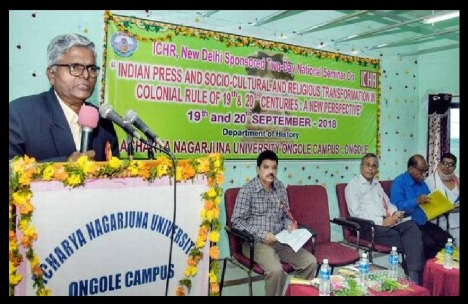
Prof Krishna Ranga Rao, key-note address
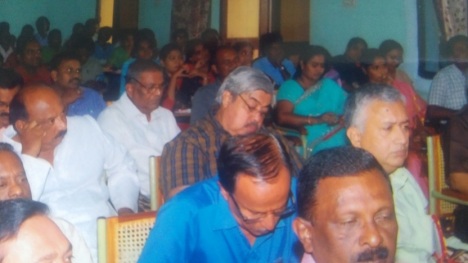
Audience Madhusudhana Rao, K. V. Ramakrishna Rao, G. Anjaiah, G.J. Sudhakar…..can be seen
12.15 to 12.32 am – Chandra Sekhara Kalkura[5]: Sri Chandra Sekhara Kalkura talking in Telugu, pointed out as to how Tanguturi Prakasam Panthulu gave away crores of worth of his property for freedom struggle. He started “Swarajya” and other papers and cined the word “Sampathaka”. He was arrested and jailed for citicizing Tanjore Collector. Gandhiji’s contribution to press also notable, as he edited and published several newspapers in English and Gujarati. He mentioned about other Telugu newspapers brought out during the 19th and 20th centuries.
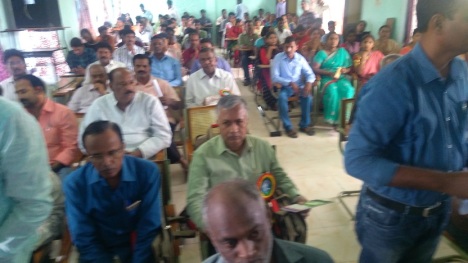
Audience
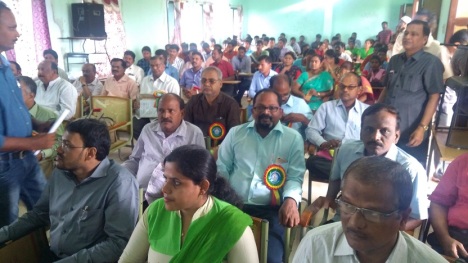
Audience RHS – Gangaiah, Sudharshan and others
12.33 to 1.00 pm – Adapa Satyanarayana[6]: It was the vernacular Press that fueled the freedom movement by acting as a bitter critic of British rule at the grassroots level, said A. Satyanarayana from Osmania University, Hyderabad while delivering the Keynote address[7]. The topic has been vast and complex and it has to be decolonized and deconstructed to interpret. The copies of “Shudhhi Kamudi” started by Rajaram Mohan Roy are not available. When Hindutwa forces are trying to dominate by revival, the press has to be secular, national and humane. He claimed that there was no communal hatred in the Hyderabad state for the 450 years period. He pointed out that Hyderabad dalits were exploited by the landlords and the high castes [without mentioning names]. Taking a cue from social reformers like Baghya Reddy Varma who brought out ‘Bhagyanagar’ journal and worked for emancipation of Dalits, the present set of newspapers and journals should voice the concern of the voiceless downtrodden sections of people[8]. Baghya Reddy Varma[9] argued that that there was no “Panchama varna,”and they were preferred to be called as “Adi Hindus.”
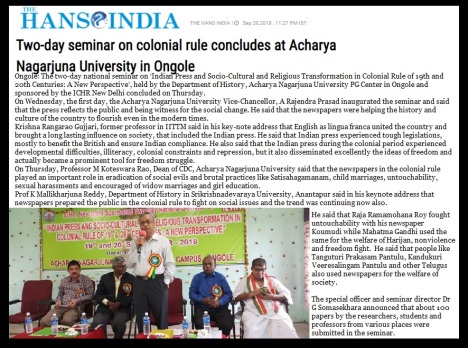
Hans India news cutting
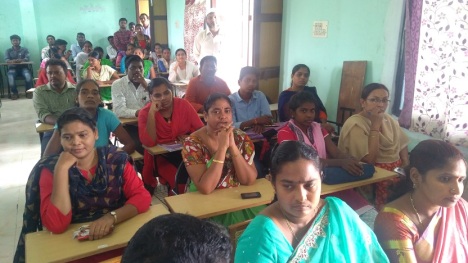
Audience view
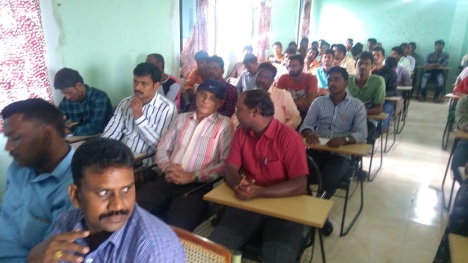
Audience, another view
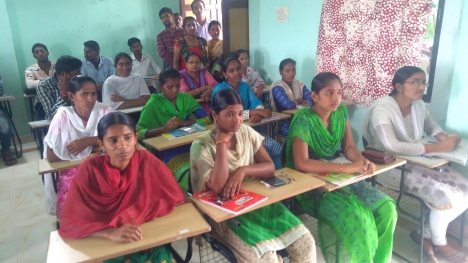
Audience, yet another view
1.00 to 1.30 pm – A. Rajendra Prasad[10]: A Rajendra Prasad, Acharya Nagarjuna University Vice-Chancellor, said that the newspapers were helping the history and culture of the country to flourish even in the modern times. He pointed out as to how the British legacy is continued in India, even after independence. As he used to interact with the British professors, he cited an anecdote. When a British officer asked him, “What is your opinion of the rule of the British and Britishers?,” he replied, “Though India gor freedom from the rule of the Britishers, still, she has not freed from the British rules.” That is, the British Act and Rules continue with Indians even today with some amendments. Slowly, Indian press is transformed into a condition that “Indian press is for the people, of the people and by the people.”
K.V. Ramakrishna Rao
23-09-2018
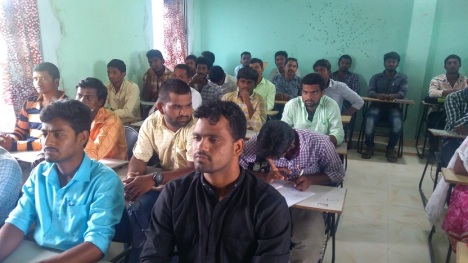
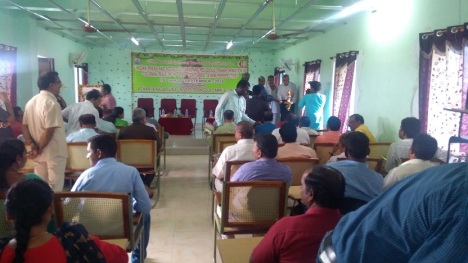
[1] Hotel Dwaraka, Poorna Residency and now Royal Residency – thus, the name has been changing with the change of ownership.
[2] THE HANS INDIA, Two-day seminar on colonial rule concludes at Acharya Nagarjuna University in Ongole, Sep 20,2018 , 11:27 PM IST
[3] Indian Institute of Tourism Management, Gwalior.
[4] http://www.thehansindia.com/posts/index/Andhra-Pradesh/2018-09-20/Two-day-seminar-on-colonial-rule-concludes-at-Acharya-Nagarjuna-University-in-Ongole/413145
[5] Kannada-Telugu schiolar, Social activist of Kurnool, former president of Library Association etc.
[6] Flat. 105, Anita Apartments, D.D. Colony, Po. Amberpet. Hyderabad-500 013, INDIA. Phone No. 91-40-27423019; mobile – 9573405551; adapa_satyam@yahoo.co.in cc adapas8@googlemail.com. Dr.phil (South Asian History) 1983 Department of History, South Asia Institute, Heidelberg University, Germany. M.Phil (Modern Indian History), 1979 Jawaharlal Nehru University, New Delhi. M.A (History) 1976 Department of History, Osmania University, Hyderabad, B. A (History) 1974 Osmania University, Hyderabad.
[7] The Hindu, Indian Press paved the way for Independence: expert, SPECIAL CORRESPONDENT ONGOLE, SEPTEMBER 20, 2018 00:00 IST; UPDATED: SEPTEMBER 20, 2018 04:13 IST
[8] https://www.thehindu.com/todays-paper/tp-national/tp-andhrapradesh/indian-press-paved-the-way-for-independence-expert/article24991037.ece
[9] Eventually, he established Adi Hindu (“Original Hindu”), a social organisation, to bring awareness in the dalits. He formed a group called Jagan Mitra Mandali in 1906, which involved Harijans and Malas, and started telling stories by ‘Hari Katha’ (popular folklore). In 1910, he started to educate dalit children from his own expense. In a short span of time he able to run 25 centres with 2000 students. 1911 Adi Hindu social services started and in 1912 promoted Buddhism. In 1917 in a conference at Vijayawada ‘Pratam Andhra – Adi Hindu’ meeting was held. In the same year Bhagya Reddy Vermas’s speech was very much attracted Mohandas Karamchand Gandhi’s attention at ‘Akhila Bharata Hindu’ round table conference in Calcutta. In 1919 a meeting held with Jangamulu, Dasulu, Mulnavasi, for the Adi Hindu beneficial program. The purpose of this event is to resolve the internal issues in their community.
[10] Prof. Prasad was a former Chairman of the Faculty of Law and former Principal of Andhra University’s Dr. Ambedkar College of Law. In 2013, Prof. Prasad was appointed head of the School of Corporate Law at the Indian Institute of Corporate Affairs (IICA), New Delhi, under the Ministry of Corporate Affairs. Prof. Prasad is also a Commonwealth Academic fellow and had worked in the Faculty of Law, University of Sheffield, UK.
Filed under: Adapa satyanarayana, ambedkar, anti-brahman, anti-brahmin, anti-hindu, conference, controversy, daily, dalit, Dravida, Dravidian, electronic media, freedom of expression, historiography, history, hyderabad, interpretation, journal, journalist, K. V. Ramakrishna Rao, language, mahatma gandhi, Mala, media, newspaper, press, print media, Ramakrishna Rao, research, research paper, researcher, social justice, woman, women | Tagged: Adapa satyanarayana, adi hindu, circulation, colonial press, colonial rule, dalit liberation, dalit politics, journal, media, Nagarjuna, nagarjuna University, newspaper, panchama, press, regulation, transformation | 2 Comments »

